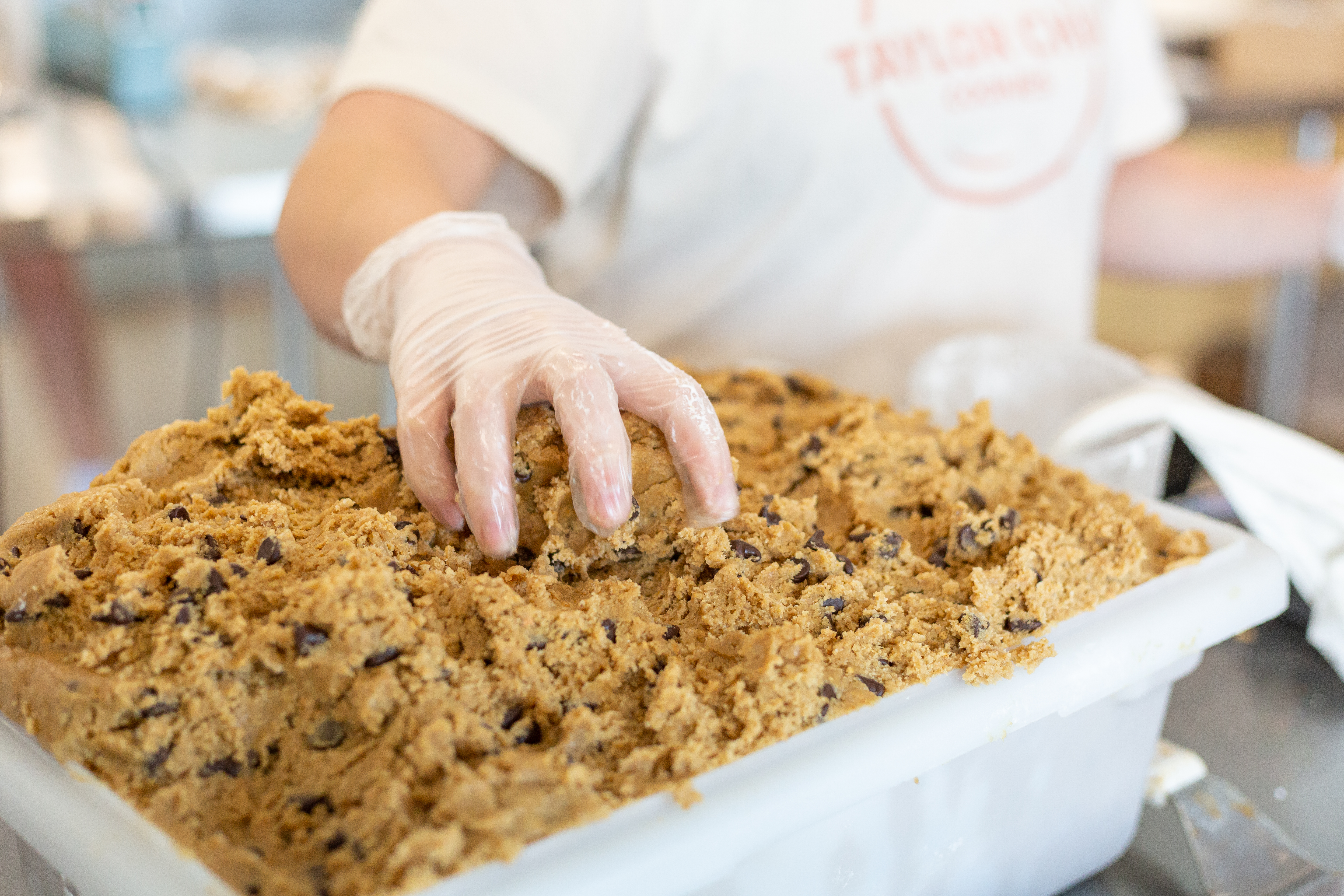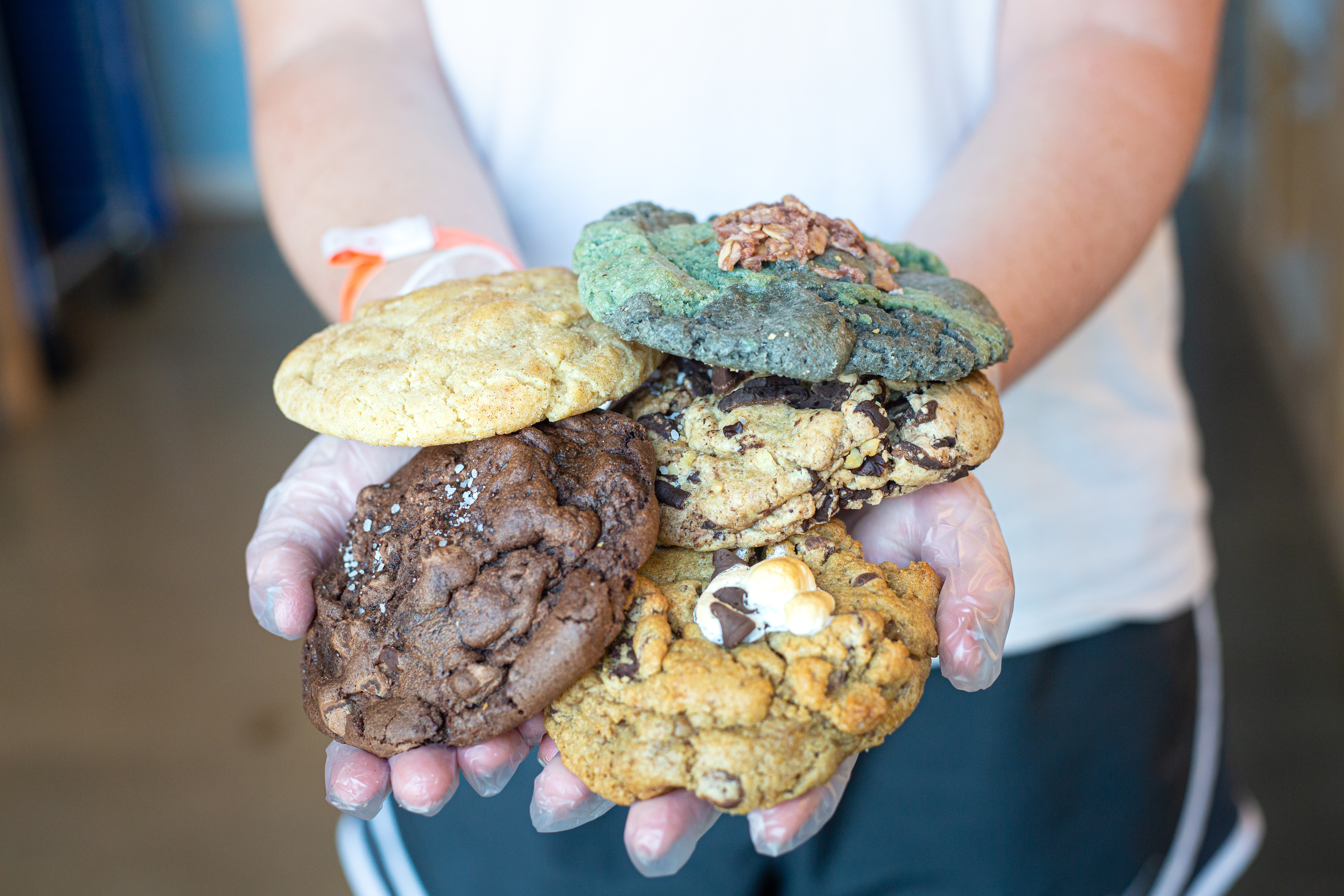Cookie butter isn't the healthiest choice due to its high sugar and saturated fat content. A typical serving contains 180-200 calories and minimal protein, contributing to potential weight gain, blood sugar spikes, and increased cholesterol levels. Consuming it in moderation is essential to avoid these health risks. Instead, consider healthier alternatives like almond or sunflower seed butter, which provide better nutritional value and similar creamy texture. Pairing cookie butter with nutrient-dense foods like fruits or whole grains can help create a more balanced diet. Learn about balanced consumption strategies and healthier substitutions to make informed dietary decisions.
Key Takeaways
- High sugar and saturated fat content in cookie butter can contribute to weight gain and increased cholesterol levels.
- Cookie butter offers minimal protein and nutritional benefits, making it a less healthy choice compared to alternatives.
- Overconsumption may lead to blood sugar spikes and increased risk of type 2 diabetes.
- Nut butters like almond or sunflower seed butter provide healthier, nutrient-rich alternatives.
- Mindful consumption and portion control are crucial to enjoy cookie butter without adverse health effects.
Caloric Content and Macronutrients
When considering cookie butter's health consequences, you should pay attention to its caloric content and macronutrients. A typical serving size of cookie butter, which is usually around two tablespoons, packs a considerable number of calories, mainly from fat and sugar, with minimal protein and fiber. Understanding these components can help you make more informed dietary choices.
Typical Serving Size and Calories
A typical serving size of cookie butter is about two tablespoons, and this small amount can pack a considerable caloric punch. According to cookie butter nutrition facts, a 2-tablespoon serving usually contains around 180 to 200 calories. This makes cookie butter a calorie-dense food, meaning it provides a large number of calories in a relatively small portion.
In this 2-tablespoon serving, you'll find about 1 to 2 grams of protein, which isn't much considering the caloric content. A notable portion of these calories comes from refined sugar, contributing to its high sugar content. Because of this, cookie butter can quickly increase your carbohydrate intake, which is something to be mindful of if you're monitoring your carb consumption.
Portion control is essential when enjoying cookie butter, as it's easy to consume more than the typical serving size without realizing it. Given its rich taste, you might be tempted to add an extra spoonful, but doing so can greatly increase your calorie intake. Being aware of these nutrition facts can help you enjoy cookie butter responsibly, ensuring it fits into your diet without overindulging.
Fat, Sugar, Protein, and Fiber Content
You're probably wondering about the macronutrient breakdown of cookie butter, especially its fat, sugar, protein, and fiber content. Cookie butter, made from crushed cookies, sugar syrup, and oils, has a notable amount of fat and sugar. The fat content primarily consists of fatty acids from the added oils, which can be high in calories. This contributes to the creamy texture and rich flavor of this delicious spread.
The sugar content in cookie butter is also considerable, largely due to the sugar syrup and refined flour used in its preparation. High sugar intake can spike your blood sugar level, leading to potential health issues if consumed in excess.
- Fatty acids: Contribute to the high-calorie content and creamy texture.
- Sugar syrup: Adds to the overall carbohydrate content and impacts blood sugar levels.
- Protein and fiber content: Generally low, offering minimal nutritional benefits.
When considering cookie butter's nutritional profile, the protein content is quite low, and the fiber content is negligible, making it less filling and less nutritious. For healthier alternatives, you might want to explore spreads made from nuts or seeds, which offer better nutritional benefits.

Choose Your Own Delightfully Perfect Cookies.
With almost 30 flavors to choose from, you can make your box as unique as you are.
Health Implications
When considering the health consequences of cookie butter, you should be aware of its potential risks for specific health conditions, especially those related to high sugar intake. The added sugars in cookie butter can contribute to weight gain, raise blood glucose levels, and increase the risk of developing type 2 diabetes. Additionally, the high sugar content might exacerbate conditions like heart disease, making moderation key if you decide to include it in your diet.
Risks for Specific Health Conditions
Digging into the potential health risks of cookie butter, it's clear that its high sugar and fat content can pack a punch when it comes to specific health conditions. For those with blood sugar control issues, the high carbohydrate content in cookie butter can be problematic, potentially causing spikes and crashes in blood glucose levels. This can be especially concerning for individuals with diabetes or pre-diabetes.
Additionally, the nutritional profile of cookie butter is not particularly heart-friendly. Its high saturated fat content can contribute to increased cholesterol levels, which is a risk factor for heart disease. If you're aiming for better heart health, cookie butter isn't the best choice.
Moreover, cookie butter can be a minefield for those with nut allergies. While some versions don't contain nuts, cross-contamination is always a risk, potentially leading to severe allergic reactions.
- Blood sugar control issues: High carbohydrate content can disrupt glucose levels.
- Heart health concerns: High saturated fat can raise cholesterol.
- Nut allergies: Risk of cross-contamination can trigger allergic reactions.
While cookie butter might seem like a delicious treat, considering these risks can help you make a healthier option for your overall wellbeing.
Impact of Added Sugars
Added sugars in cookie butter can have important health consequences. When you enjoy a sweet indulgence like cookie butter, you're often consuming added sugars such as brown sugar, cane sugar, or even maple syrup. These ingredients can cause a blood sugar spike, which might lead to quick bursts of energy followed by a crash, making you feel tired and hungry again soon after. It's not just about energy levels; frequent blood sugar spikes can contribute to insulin resistance over time, increasing your risk for type 2 diabetes.
Additionally, added sugars can lead to the growth of sugar bugs, another term for the harmful bacteria in your mouth that cause cavities and gum disease. Even if a cookie butter brand uses natural sweeteners like monk fruit, it's still important to consume it in moderation. Overconsumption of any type of added sugar can contribute to weight gain and other health issues.
Healthier Alternatives
You might consider trying homemade low-sugar versions of cookie butter, which allow you to control the ingredients and reduce the sugar content. Nutritious substitutes like almond butter or peanut butter provide similar textures and flavors while offering more protein and healthy fats. By choosing these alternatives, you can enjoy a tasty spread without compromising your health.
Homemade Low-Sugar Versions
Creating homemade low-sugar versions of cookie butter can be a game-changer for those seeking healthier alternatives without sacrificing taste. By making your own, you have full control over the ingredients, allowing you to craft a healthier cookie butter recipe with simple ingredients. Utilizing a food processor, you can blend nut butters like almond butter or coconut butter into a creamy spread that satisfies your sweet tooth without the excessive sugar found in store-bought versions.
To get started, you'll need just a few basic components:
- Nut butter: Almond butter or coconut butter work well.
- Sweetener: Opt for low-sugar alternatives like stevia or monk fruit.
- Spices: Cinnamon, vanilla extract, and a pinch of salt enhance the flavor.
Blend these in a food processor until smooth, adjusting the consistency with a bit of coconut oil if needed. The result is a delicious, low-sugar homemade cookie butter that you can enjoy guilt-free. Store your creation in an air-tight container to maintain its freshness and flavor. By following this method, you can enjoy a healthier, tastier spread that aligns with your dietary goals.
Nutritious Substitutes
Why settle for traditional cookie butter when you can explore nutritious substitutes that offer a healthier twist? Sunflower seed butter is a fantastic alternative, packed with a variety of nutrients, including vitamin E and healthy fats. It provides a creamy texture similar to cookie butter but with added health benefits. Almond butter, creamy and rich, is another excellent substitute. It's loaded with protein, fiber, and essential minerals like magnesium and calcium.
If you enjoy making your own spreads, consider creating homemade nut butter. You can use a mix of nuts and seeds to tailor the flavor and nutritional profile to your liking. Seed butter options, such as pumpkin or chia seed butter, are also worth exploring for their unique nutrient content and health benefits.
For those on specific diets, keto-compatible alternatives like a low-carb, healthy cinnamon cookie butter provide a tasty yet nutritious option. Additionally, incorporating these substitutes into a protein bar recipe can offer a convenient and wholesome snack. Don't forget about non-dairy milk options to complement your new spread choices. By choosing these nutritious substitutes, you'll enjoy delicious flavors while maintaining a healthier lifestyle.
Incorporating Cookie Butter into a Balanced Diet
To enjoy cookie butter without compromising your health, consider pairing it with nutrient-dense foods like fruits or whole-grain bread. Mindful consumption is key, so pay attention to portion sizes and savor each bite. By balancing your indulgence with healthier options, you can fit cookie butter into a well-rounded diet.
Pairing with Nutrient-Dense Foods
Balancing indulgence with nutrition can be a delightful challenge, especially when incorporating treats like cookie butter into your diet. You can make cookie butter healthier by pairing it with nutrient-dense foods to create balanced snacks. One idea is to make a homemade spread combining cookie butter with almond butter or peanut butter. This blend provides a creamy peanut butter consistency and adds protein and healthy fats from almonds or peanuts.
Consider spreading cookie butter on slices of fresh fruit such as apples or bananas. This combination not only enhances the flavor but also contributes essential vitamins and fiber, making your snack more nutritious. You can also mix cookie butter with almond milk for a delicious smoothie, adding an extra layer of nutrients.
Here are some tasty pairing ideas:
- Fresh fruit: Apples, bananas, and berries.
- Nut and seed blends: Almond butter, peanut butter, sunflower seed blends.
- Smoothies: Mix cookie butter with almond milk or yogurt.
Mindful Consumption and Portion Control
While pairing cookie butter with nutrient-dense foods can enhance its nutritional value, it's equally important to practice mindful consumption and portion control. A cookie butter obsession can easily lead to overindulgence, negatively impacting your health. Practicing mindful consumption means being aware of how much you're eating and savoring the experience without overdoing it. Portion control is vital; even a small amount of cookie butter can satisfy your craving for something sweet.
Incorporating cookie butter into your diet in moderation allows you to enjoy its creamy texture and authentic cookie butter consistency without consuming excessive calories and carbs. Health-conscious eating involves balancing indulgent treats with nutritious foods. For example, a tablespoon of cookie butter spread on apple slices can offer a delightful contrast of flavors and textures while keeping your consumption in check.
Commercial cookie butters often contain added sugars and fats, so it's important to read labels and be mindful of serving sizes. A common pitfall in food diets is not accounting for these extra calories. By practicing portion control and consuming cookie butter in moderation, you can enjoy this treat as part of a balanced, health-conscious diet.
Frequently Asked Questions
What Are the Main Ingredients in Cookie Butter?
Cookie butter's main ingredients typically include crushed speculoos cookies, vegetable oils, sugar, and flour. You'll also find it contains additional ingredients like emulsifiers, salt, and spices such as cinnamon and nutmeg. The crushed cookies provide a base, while the oils and sugar create a smooth, spreadable texture. Emulsifiers help blend the ingredients seamlessly, ensuring a consistent mixture. The spices add a distinctive flavor profile, making cookie butter unique.
Can Cookie Butter Be Made at Home?
Yes, you can make cookie butter at home. Start by crushing your choice of cookies into fine crumbs using a food processor. Then, blend the crumbs with melted butter, sweetened condensed milk, and a bit of vanilla extract until smooth. Adjust the texture by adding milk or a non-dairy alternative. Store your homemade cookie butter in an airtight container, refrigerating it for a longer shelf life.
Is Cookie Butter Gluten-Free?
Cookie butter's gluten-free status depends on the ingredients used. Typically, it contains crushed cookies, which are often made with wheat flour and consequently contain gluten. However, you can find or make gluten-free versions by using gluten-free cookies. Always check ingredient labels for any hidden sources of gluten, and verify that the product is certified gluten-free to avoid cross-contamination if you have celiac disease or gluten sensitivity.
How Long Does Cookie Butter Stay Fresh?
Cookie butter typically stays fresh for about two weeks when stored at room temperature. Make sure to keep it in an airtight container to prevent it from drying out or absorbing other odors. If you refrigerate cookie butter, it can last up to two months, though the texture might become firmer. Always check for any signs of spoilage, such as mold or an off smell, before consuming.
Are There Any Vegan Options for Cookie Butter?
Yes, there are vegan options for cookie butter. Many brands offer versions made without any animal products, using plant-based ingredients instead. These vegan alternatives typically use oils like coconut or palm oil, and plant-based milk substitutes. When searching for vegan cookie butter, check the label for certifications or specific mentions of being vegan-friendly. You can find these options in health food stores or online, catering to various dietary preferences.
Conclusion
To sum up, while cookie butter is delicious, it's not the healthiest choice due to its high caloric content and limited nutritional value. Consuming it sparingly and in moderation is key to maintaining a balanced diet. Opt for healthier alternatives when possible, and if you do enjoy cookie butter, integrate it thoughtfully into your meals. Being mindful of its health consequences will help you make better dietary choices and support overall wellness.









